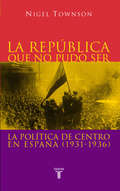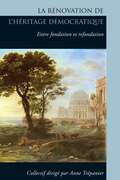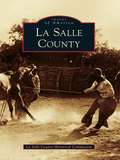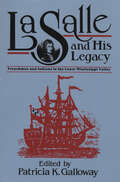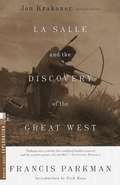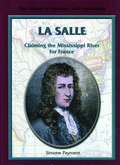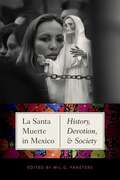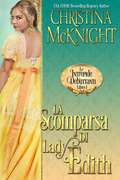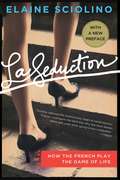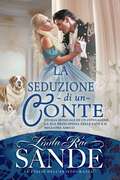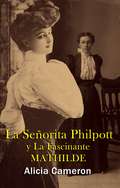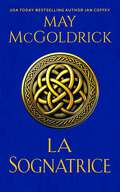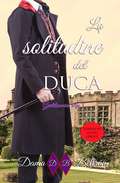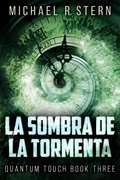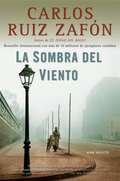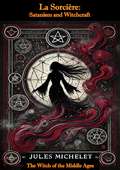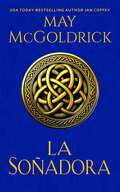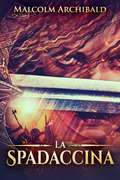- Table View
- List View
La República que no pudo ser: La política de centro en España (1931-1936)
by Nigel TownsonEste libro enfoca desde una nueva perspectiva uno de los capítulos más importantes de nuestra historia y cubre un vacío fundamental en la historiografía de este periodo. Frente a la tan manida idea de las dos Españas, Nigel Townson nos ofrece un deslumbrante análisis de las causas que originaron la Guerra Civil española, destacando la actuación del Partido Republicano Radical, representante de la política centrista. Apoyándose en el Archivo de la Guerra Civil y documentos inéditos hasta ahora de Alejandro Lerroux, entre otros, esta obra arroja nueva luz sobre los acontecimientos previos al conflicto, en especial a la «Sanjurjada» de 1932, las crisis políticas del año siguiente, el rol de la masonería, el escándalo del estraperlo y la alianza del centro y la derecha que dominó España entre 1933 y 1935.
La Ricerca
by Kathryn Le Veque1298 d.C. - Lady Diamantha de Bocage Edlington perse suo marito nella Battaglia di Falkirk. In lutto, lei è impreparata alla visita di Sir Cortez de Bretagne, comandante di guarnigione per Re Edward al Castello di Sherborne. Moro e focoso dalla sua eredità spagnola, Cortez è un cavaliere di bell'aspetto sensuale e dal carattere irascibile. Lui è anche venuto in una missione. Cortez era l'ultimo ad aver visto da vivo il marito di Diamantha e aveva promesso a quest'ultimo morente che si sarebbe preso cura di sua moglie. Lui è venuto perciò a reclamarla. Sconvolta, fa fatica ad accettare quello che le sta dicendo de Bretagne, ma in cuor suo, risentimento e odio si fondono: il cadavere di Robert Edlington è stato lasciato sui campi di Falkirk e de Bretagne, essendo l'ultimo ad averlo visto, è da incolpare. Perciò, prima che Diamantha diventi la moglie di de Bretagne, gli fa una richiesta: di ritornare per il corpo di Robert e di riportarlo a casa per un'adeguata sepoltura. E quindi, la grande Ricerca per ritrovare il corpo di Robert Edlington inizia... Unisciti a Diamantha e a Cortez nel loro incredibile viaggio dalla campagna di Dorset fino ai gloriosi campi di Falkirk, un viaggio in cui scoprono cose incredibili e terribili sul mondo, sul loro paese e su di loro. Dalle ceneri del lutto si eleva una fenice di grande passione, e viene forgiato un legame tra Diamantha e Cortez che non potrà mai essere spezzato.
La Rosa del mare
by Amylynn BrightRoselyn sta navigando per fare una sorpresa al suo fidanzato, ma la sua nave affonda; fortunatamente viene salvata da un famoso pirata: Handsome Jack. Quando la nave su cui viaggiava affonda, durante una terribile tempesta, Roselyn è certa che non rivedrà mai più suo fidanzato. Dopo aver ripreso conoscenza, si ritrova su una nave pirata, la Vendetta di Nettuno, dentro al letto di un famigerato pirata, Handsome Jack. Fino a quel momento Roselyn non aveva idea di quanto, in fondo al suo cuore, desiderasse l’avventura. Quando arriverà a Nassau, il suo fidanzato la vorrà ancora? Jack la lascerà andare? Chissà se questa pausa selvaggia sarà l’unica che il destino ha in serbo per lei…
La Rénovation de l'héritage démocratique: Entre fondation et refondation
by Anne TrépanierLes expressions politiques du Québec et du Canada donnent l’impression d’une quête identitaire perpétuelle. L’obsession du moi est passée du « je » au « nous ». Ce collectif pluridisciplinaire donne une portée philosophique et historique à la question du renouveau démocratique au Québec et au Canada. La tension entre les identités citoyennes et les identités des groupes exige l’émergence ou la renaissance d’un référent politique collectif et invite à la reformulation du credo identitaire, à la rénovation de l’héritage commun. Cet ouvrage examine la nature de ce mouvement de refondation et regarde comment le groupe est convié à participer à cet exercice de se nommer. Publié en français
La Saga di al-Andalus, Libro Primo: La Città Splendente
by Joan FallonEsotica, romantica e basata su un'attenta ricerca storica, “La Città Splendente” è una storia senza tempo di passione e legami familiari, che segue gli inaspettati sviluppi innescati delle nostre azioni. Ambientata nella Spagna del X secolo, al tempo dell’occupazione araba, è però soprattutto una storia sull’amore e l’onore. Trasferitosi a Madinat al-Zahra, Qasim crede di essersi lasciato il suo passato turbolento alle spalle, ma quando il figlio minore, Omar, perde la testa per la concubina del Califfo, scatena una serie di conseguenze inimmaginabili, che mettono tutta la sua famiglia in pericolo, Qasim incluso. Il suo segreto, infatti, sta per tornare a galla, rischiando di distruggere tutto ciò per cui ha lavorato sodo.
La Salle
by Kristin PetrieThis biography introduces young readers to the life of Frenchman René-Robert Cavalier de La Salle. Readers learn about La Salle's childhood, education, and family life in France as well as his time in New France as a farmer and a fur trader. La Salle's exploration of the Ohio River for New France's governor Daniel de Rémy, Sieur de Courcelles is discussed. Also introduced is Jacques Marquette and Louis Jolliet's exploration of the Mississippi River during La Salle's time. Readers discover that King Louis XIV of France granted La Salle permission to explore western New France. And using a detailed map, readers follow La Salle's path through Lakes Ontario, Erie, Huron, and Michigan; his stops in present-day Green Bay, Wisconsin, and St. Joseph, Michigan; and his trips down the Kankakee, Illinois, and Arkansas rivers to the Gulf of Mexico. The book explains that La Salle was the first European to explore the length of the Mississippi River, he claimed the entire Mississippi River basin for France, and that the United States bought this territory from France in an agreement called the Louisiana Purchase. Full-color photos, an index, a timeline, discussion questions, bold glossary terms, and phonetics accompany easy-to-read text.
La Salle County (Images of America)
by La Salle County Historical CommissionThe Nueces River runs west to east across La Salle County, and at one time it served as the boundary between Texas and Mexico. The Treaty of Guadalupe Hidalgo, signed in 1848, ceded the Nueces Strip to Texas. La Salle County was formed out of some of this land in 1858. Early settlers struggled to survive in the wild terrain amid fears of attacks from outlaws and natives. From the Indian Raid of 1878 and the assassination of a sheriff, to droughts and dust storms, the hardy people of La Salle County persevered. After an election in 1883, Cotulla was selected as the permanent county seat, a courthouse was erected, and churches and schools were built. The lawlessness of the past is gone, but the county's residents share the perseverance of those early pioneers.
La Salle and His Legacy: Frenchmen and Indians in the Lower Mississippi Valley
by Patricia K. GallowayTo most people it probably seems that La Salle and his men, permanently fixed in the pantheon of explorers of the North American continent, need little further introduction. The fact is that this whole early period of exploration and colonization by the French in the southeastern United States has received far less scholarly attention than the corresponding English and Spanish activities in the same area, and even the existing scholarship has failed to focus clearly upon the Indian tribes whose attitudes toward the European new comers were crucial to their very survival. In this collection of essays marking the tricentennial of René-Robert Cavelier de La Salle's 1682 expedition into the Lower Mississippi Valley, thirteen scholars from a variety of disciplines assess his legacy and the significance of French colonialism in the Southeast. These scholars in the fields of French colonial history and the ethnohistory of the Indians of the Louisiana Colony deal with a diversity of topics ranging from La Salle's expedition itself and its place in the context of New World colonialism in general to the interaction of French settlers with native Indian tribes.
La Salle and the Discovery of the Great West
by Francis ParkmanThis book, based on the eleventh edition of Parkman's classic study The Discovery of the Great West, reflects the author's access to new materials relating to La Salle's explorations.
La Salle: Claiming The Mississippi River For France (The Library Of Explorers And Exploration Series)
by Simone PaymentRene-Robert Cavalier, Sieur de La Salle devoted his life to the discovery and exploration of the Mississippi River. He believed that the great river would provide him with an easier route to China, where he could find valuable silks and spices. His revised goal was to create a French empire in North America that would stretch from Canada to the Gulf of Mexico. This book follows La Salle on his tireless expeditions and teaches readers the value of persistence even when no one else believes in the cause.
La Santa Muerte in Mexico: History, Devotion, and Society
by Wil G. PanstersFor over a decade the cult of La Santa Muerte has grown rapidly in Mexico and the United States. Thousands of people—ranging from drug runners and mothers to cabdrivers, soldiers, police, and prison inmates—invoke the protection of La Santa Muerte. Devotees seek her protection through practicing popular vows, attending public rosaries and masses at street altars, and constructing and maintaining home altars.This book examines La Santa Muerte&’s role in people&’s daily lives and explores how popular religious practices of worship and devotion developed around a figure often associated with illicit activities. She represents life with the possibility of respite but without ultimate redemption, and she speaks to the complexities of lives lived at the fringes of violence, insecurity, impunity, and economic hardship. The essays collected here move beyond the visually arresting sight of La Santa Muerte as a tattoo or figurine, suggesting that she represents a major movement in Mexico.
La Scomparsa di Lady Edith (Le Intrepide Debuttanti, Libro #1)
by Maria De Bonis Christina McKnightUna tragica notte cambia la vita di Lady Edith Pelton, ragazza giudiziosa e perbene: quando la sua migliore amica muore, spinta giù dalle scale da un malvagio lord. Ora, Edith dedica il suo tempo a sorvegliare l’uomo che ritiene responsabile, mentre raccoglie informazioni per denunciare altri furfanti che fingono di essere uomini d’onore a Londra. Quando viene scoperta a spiare da un perfetto sconosciuto, Edith si ritrova con due misteri - che cosa è successo all’amica e come conquistare il cuore di quel lord terribilmente affascinante. Triston Neville, visconte Torrington, deve portare a termine due compiti nella prossima stagione londinese: assicurarsi che le sue sorelle traggano il massimo vantaggio dal loro debutto in società ed evitare di farsi coinvolgere in un altro scandalo. Quello che non si aspetta è l’accattivante fanciulla dai capelli biondi che precipita letteralmente sul suo cammino. Quando la misteriosa Lady Edith scompare all’improvviso senza lasciare traccia, Triston teme che ci sia la possibilità che i suoi antichi misfatti siano ritornati per distruggere nuovamente la sua vita. Riuscirà Triston a mettere insieme i pezzi del puzzle in tempo per salvare Edith e dimostrare che il suo amore non è nient’altro che sincero?
La Seduction: How the French Play the Game of Life
by Elaine SciolinoThe hidden truth about the French way of life: it's all about seduction: its rules, its pleasures, its secrets. France is a seductive country, seductive in its elegance, its beauty, its sensual pleasures, and its joie de vivre. But Elaine Sciolino, the longtime Paris bureau chief of The New York Times, has discovered that seduction is much more than a game to the French: it is the key to understanding France. Seduction plays a crucial role in how the French relate to one another - not just in romantic relationships, but also in how they conduct business, enjoy food and drink, define style, engage in intellectual debate, elect politicians, and project power around the world. While sexual repartee and conquest remain at the heart of seduction, for the French seduction has become a philosophy of life, even an ideology, that can confuse outsiders. Sciolino gives us an inside view of how seduction works in all areas, analyzing its limits as well as its power. She demystifies the French way of life in an entertaining and personal narrative that carries us from the neighborhood shops of Paris to the halls of government, from the gardens of Versailles to the agricultural heartland. Seduction a la Francaise will charm you and encourage you to lower your defenses about the French. Pull up a chair and let Elaine Sciolino seduce you.
La Seduzione Di Un Conte (Le Figlie dell'Aristocrazia #3)
by Linda Rae SandeNon si sono mai sposati per amore. Ma i loro sentimenti diventeranno qualcosa di più? Henry Forster ha sempre amato una sola donna. Ma c'è un problema: è la figlia di un contadino e la sua famiglia non gli permetterebbe mai di sposare una ragazza con uno status basso come il suo. Ora che è un conte che ha bisogno di un erede, Henry è costretto a cercare una moglie, ma è determinato a tenere la sua amante al proprio fianco. Hannah Slater ha capito molto tempo fa che gli uomini non amano mai le loro mogli. Ha fatto pace con quella conoscenza e il suo disperato bisogno di un figlio la spinge ad accettare il corteggiamento senza fronzoli e la proposta di matrimonio di Henry. Non le importa della sua amante, a patto che le dia quello che vuole. Ma mentre si stabiliscono nella vita matrimoniale, un'improbabile scintilla inizia a ribollire tra i due. Henry arriva ad ammirare l'atteggiamento audace e il senso degli affari della sua nuova moglie, e Hannah è costretta a ripensare al suo atteggiamento nei confronti degli uomini sposati. Ma quando la tragedia colpisce, la coppia sarà spinta l'una nelle braccia dell'altro? O finiranno per sempre bloccati in un matrimonio senza amore?
La Sete di Sangue
by Simone BeaudelairePrimavera, 1945. La guerra in Europa sta finendo, ma nel quartiere francese di New Orleans le notti afose nascondono un pericolo ancora maggiore per l'umanità. Contro l'antico e sanguinario male si erge lo scienziato Philippe Dumont, che corre contro il tempo per curare una malattia che assomiglia alla febbre gialla, ma non lo è. La ricercatrice in erba Daphne Delaney si unisce a Philippe, sperando di prevenire il piano del loro potente nemico. Ma né Daphne né Philippe possono percepire la portata del pericolo che corrono, né la passione che scopriranno l'uno per l'altra. Dalla New Orleans urbana alle profondità del bayou, Philippe dovrà inseguire il mostro per salvare la donna che ama. Ma il Re dei vampiri non avrà pace finché gli amanti non gli apparterranno... per tutta l'eternità.
La Señorita Amelia Pesca a un Duque
by Sandy Raven Marta“No tengo la costumbre de ir pidiéndoles a las damas que se casen conmigo. De hecho, sois la segunda mujer que ha recibido nunca tal… invitación.” Se aproximó un poco más a ella, hasta acercarse tanto que podía ver el leve temblor de su delicioso labio inferior. “Y me devolvió el beso, Amelia, no pretenda que no.” Vio indecisión, miedo, e incluso deseo en el rostro de ella, vuelto hacia él. Cav deseaba volver a besarla, pero temía que se asustase. Como si pudiera leer sus pensamientos, ella se giró hacia las puertas abiertas que daban al jardín. “Si bien hasta ayer por la noche nunca había sentido deseos de casarme, ahora sí los siento.” “¡Lo ve! Acaba de admitir que no desea casarse conmigo”, conjeturó ella. “Y yo no deseo casarme con un hombre solo porque haya sido sorprendido besándome. Bueno… Con las mismas, podría decirme directamente que yo era su segunda elección.” Cav intentó atraer su atención mientas ella recorría incansable el espacio entre el servicio de té y las puertas francesas. Pero ella ni se fijaba en él mientras continuaba. “No quiero ser el segundo plato de ningún hombre. Quiero, no… Merezco ser el único deseo de un hombre.” Se detuvo, le miró y añadió “Por ello, debo rechazar su generosa oferta, Excelencia.” Él no podía creer lo que estaba escuchando. Cualquier otra mujer habría aceptado su oferta de matrimonio, y las dos únicas mujeres a las que se había declarado, le habían rechazado. Oh, no dudaba que conseguiría hacerla entrar en razón. Cav sabía que todo lo que tenía que hacer era besar a Amelia, y ella diría que sí. Pero esto era diferente. Amelia era diferente. Con toda probabilidad, había cuidado de su familia incluso en vida de su padre. No conocía otra cosa. ¿Cómo iba a convencerla de que ella, la Señorita Amelia Manners-Sutton, era el objeto de su deseo? Le apartó un mechón rebelde de cabello de la car
La Señorita Philpott and la Fascinante Mathilde
by Alicia Cameron Marisa PavanCuando se queda sin trabajo como institutriz, la señorita Philpott, vuelve a reunirse con Francine; nunca adivinaría cómo podría transformarse su vida. Durante una nueva era Eduardiana (la era de Downton Abbey), hay muchos cambios para las mujeres. Pero la señorita Philpott tiene ahora cuarenta años y siente que todas las innovaciones del nuevo siglo tienen poco que ver con ella. Pero está muy equivocada. Con la ayuda de Francine, está por transformarse en una mujer moderna y por descubir que tiene talentos que nunca hubiese soñado que tenía. Sus habilidades está limitadas sólo por su imaginación, y como lectora ávida, la imaginación de la señorita Philpott es muy prodigiosa. Esta novela continúa las aventuras de Francine, las criadas descartadas de las damas de la historia corta original, cuyo efecto en la vida a su alrededor es empoderamiento feliz. Agrega romance y aventura a su cuento de mujeres que surgen de las sombras para reclamar sus propias vidas.
La Sognatrice: Trilogia del Tesoro delle Highlands (Trilogia del Tesoro delle Highlands)
by Jan Coffey May McGoldrickIniziata con La Sognatrice, la Trilogia del Tesoro delle Highlands di May McGoldrick cattura le vite e gli amori di tre sorelle scozzesi. Le sorelle Percy hanno in mano un indizio sul tesoro della loro famiglia… e la chiave del cuore di tre guerrieri delle Highlands... Quando il suo defunto padre fu bollato come traditore del re, Catherine Percy trovò rifugio in Scozia. Ma un caso di scambio di identità la mise in una posizione compromettente con il conte delle Highlands che aveva giurato di proteggerla. Il matrimonio con lui salvò la sua reputazione, ma nulla poté salvarla dalla passione che piegò il suo corpo alla sua volontà... e mandò in frantumi le sue ultime difese! A Proposito di La Sognatrice... "UN TESORO ASSOLUTO! Adoro questo libro. Ho appena finito di leggerlo per la seconda volta, anche se non so dire perché non l'ho recensito la prima volta. In ogni caso, questo libro è fantastico. La trama e il cast di personaggi sono dinamici e la storia che si sviluppa avvincente". - Recensione online del lettore
La Solitudine del Duca: Gentiluomini serie I
by Dama BeltránLa vita libertina del futuro Duca di Rutland termina quando viene sconfitto in un duello d'onore da un marito tradito. Sconvolto dalle conseguenze della sfida, decide di lasciare Londra e di recarsi a Haddon Hall, il luogo tranquillo dove è cresciuto, sperando di trovare la pace di cui ha urgentemente bisogno; tuttavia, l'arrivo di una notizia inaspettata altera la presunta calma e spinge il duca a ubriacarsi. Nonostante i consigli del suo entourage, decide di andare a cavallo e galoppare intorno alle sue terre. Quando apre gli occhi dopo una sfortunata caduta, scopre che una donna si è presa cura di lui in un luogo lontano e nascosto delle sue terre. Il suo nome, Beatrice, e il suo unico desiderio, di vivere in solitudine per il resto della sua vita.
La Sombra De La Tormenta
by Michael R. SternCuando abrió un portal en la Oficina Oval, Fritz Russell acordó ayudar a hacer del mundo un lugar más seguro. Salvó rehenes, evitó una guerra nuclear y comenzó una vida de emoción y peligro que nunca vio venir. Ahora, un grupo terrorista ha capturado al presidente y Fritz debe recurrir al portal como arma para salvarlo. Pronto, los disturbios aumentan y Fritz se convierte así mismo en un objetivo. El portal puede ser la única forma en que se puede salvar al presidente y acabar con el creciente peligro. Pero contra un poder que no se detendrá ante nada para traer el caos al mundo, ¿puede Fritz prevalecer?
La Sombra del Viento: La Sombra Del Viento
by Carlos Ruiz ZafónUn amanecer de 1945, un muchacho es conducido por su padre a un misterioso lugar oculto en el corazón de la ciudad vieja: el Cementerio de los Libros Olvidados. Allí encuentra La Sombra del Viento, un libro maldito que cambiará el rumbo de su vida y le arrastrará a un laberinto de intrigas y secretos enterrados en el alma oscura de la ciudad. Ambientada en la enigmática Barcelona de principios del siglo XX, este misterio literario mezcla técnicas de relato de intriga, de novela histórica y de comedia de costumbres, pero es, sobre todo, una tragedia histórica de amor cuyo eco se proyecta a través del tiempo. Con gran fuerza narrativa, el autor entrelaza tramas y enigmas a modo de muñecas rusas en un inolvidable relato sobre los secretos del corazón y el embrujo de los libros, manteniendo la intriga hasta la última página.
La Sorcière: Satanism And Witchcraft - The Witch Of The Middle Ages
by Jules MicheletLa Sorcière: Satanism and Witchcraft - The Witch of the Middle Ages by Jules Michelet is a captivating and provocative exploration of the history of witchcraft, the persecution of witches, and the complex societal forces that shaped the witch hunts of the Middle Ages. Originally published in 1862, this groundbreaking work by the renowned French historian offers a unique blend of historical analysis, social commentary, and romanticism, painting a vivid picture of the witch as both victim and rebel.Michelet's La Sorcière delves into the dark and often tragic lives of women accused of witchcraft, examining how these women, often healers, midwives, and wise women, became targets of fear and hatred in a patriarchal society. He portrays the witch as a symbol of resistance against the oppressive structures of the medieval Church and feudal society, a figure who embraced forbidden knowledge and ancient, pagan practices that challenged the established order.Through his lyrical and passionate prose, Michelet presents the witch not only as a tragic victim of persecution but also as a misunderstood and powerful embodiment of female strength, knowledge, and defiance. He explores the witch’s connection to nature, her role in local communities, and the complex relationships between witchcraft, heresy, and Satanism.La Sorcière is more than just a historical study; it is a deeply humanistic and empathetic portrayal of those who suffered under the brutal weight of superstition and religious zealotry. Michelet’s work has influenced generations of historians, feminists, and scholars of the occult, offering a powerful critique of the social and religious forces that fueled the witch hunts.This book is an essential read for anyone interested in the history of witchcraft, the social dynamics of the Middle Ages, and the enduring cultural legacy of the witch. La Sorcière continues to resonate with modern readers, providing a compelling and insightful look into the dark chapters of history and the resilience of those who lived through them.
La Soñadora: Trilogía del Tesoro de las Highlands (Trilogía del Tesoro de las Highlands)
by Jan Coffey May McGoldrickTrilogía del Tesoro de las Highlands- Libro 1 Comenzando con El soñador, la trilogía Tesoro de las Highlands, May McGoldrick captura las vidas y los amores de tres hermanas escocesas. Cada una de las hermanas Percy tiene una pista sobre el tesoro de su familia y la llave del corazón de tres guerreros de las Highlands... Cuando su difunto padre fue calificado de traidor al rey, Catherine Percy encontró refugio en Escocia. Pero un error de identidad la puso en una situación comprometida con el conde de las Highlands que había jurado protegerla. Casarse con él salvó su reputación, pero nada pudo salvarla de la pasión que doblegó su cuerpo a su voluntad... ¡y destrozó su última defensa! Sobre La Soñadora... "¡UN TESORO ABSOLUTO! Me encanta este libro. Acabo de terminar de leerlo por segunda vez; aunque no puedo decir por qué no lo reseñé la primera vez. En cualquier caso, este libro es increíble. La trama y el elenco de personajes son dinámicos, y la historia que se desarrolla, convincente." - Reseña del lector en línea
La Spadaccina
by Malcolm ArchibaldI Norreni pensavano di poter conquistare la Scozia. Si sbagliavano. Melcorka è un'ordinaria giovane donna delle Isole. Ma quando la sua terra natia, Alba, viene attaccata da un'orda vichinga, Melcorka abbandona la sua vita agiata ed intraprende il cammino della guerriera. Con una sgangherata banda di compagni, si dirige a sud per riunire i clan e liberare la terra dal flagello degli Uomini del Nord - e rivendicare il proprio destino.
La Sposa di MacAuley
by Tanya Anne Crosby Ernesto PavanL'ereditiera di Boston Sophia Vanderwahl è venuta a conoscenza del fatto che il suo fidanzato è un disgustoso donnaiolo. Bramosa di vendetta, decide di raggiungere il fedifrago in Messico per restituirgli l'anello di fidanzamento, ingaggiando a tale scopo un vecchio rivale dell'uomo. Pur sospettando delle motivazioni di Sophie, Jack MacAuley ha bisogno del denaro per finanziare la propria spedizione. Nel corso di questa romantica e non troppo seria storia di navigazione, Jack e Sophie impareranno a fidarsi l'uno dell'altra, tanto in amore quanto in amicizia.
